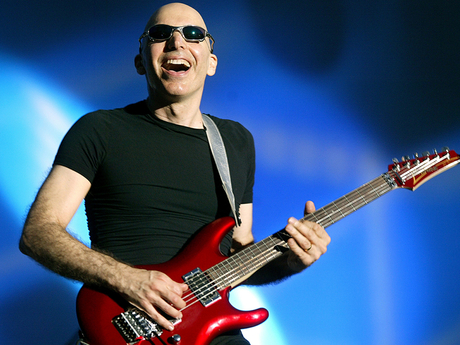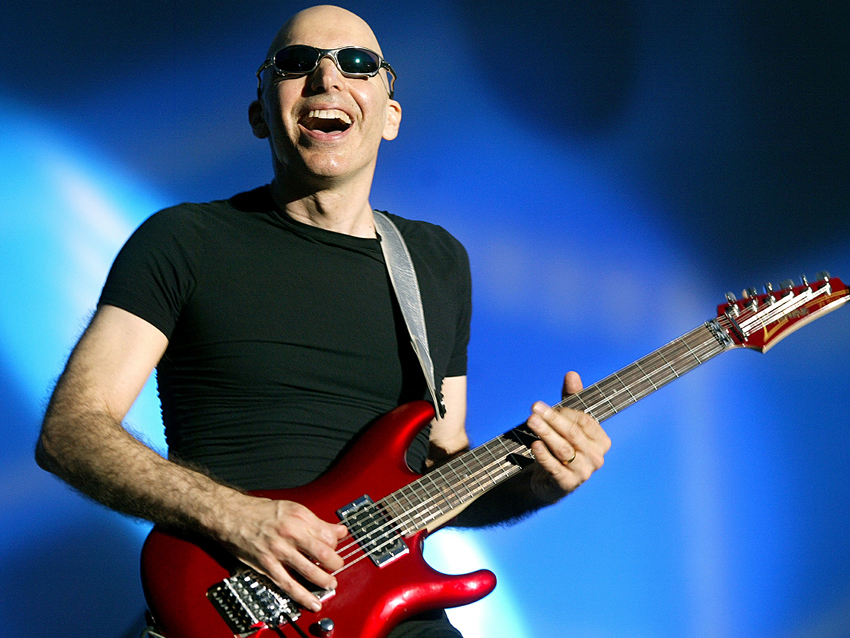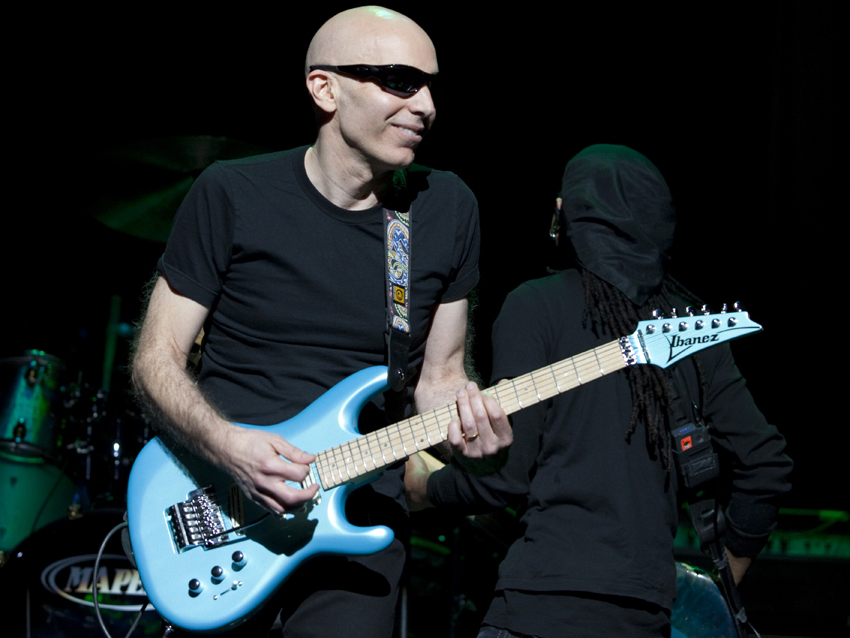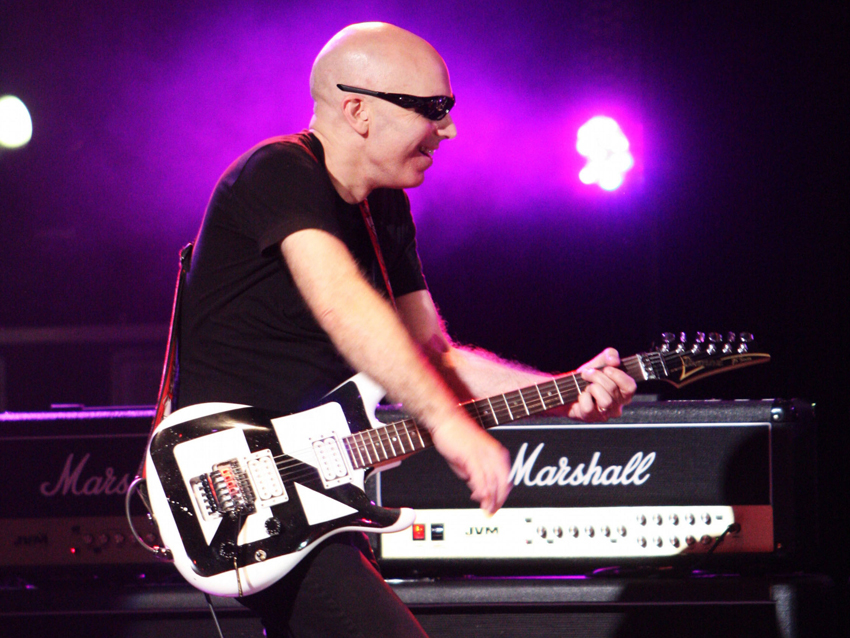

Joe Satriani is all smiles as he plays in Bombay, India, 2005. © Punit Paranjpe/Reuters/Corbis
Now that Joe Satriani's new album, Black Swans And Wormhole Wizards, has been released, the world is finally getting a chance to hear what very well could be the guitar icon's finest work yet. And with a European tour about to kick off in a matter of weeks, audiences will be afforded the opportunity to hear a good chunk of the disc's 11 songs rendered live.
"I'm really excited to take these songs out on tour and see how people respond," said Satriani, who previewed the album exclusively for MusicRadar literally weeks after he finished overseeing the final mixes. "It's not a typical record for me," he explained. "Not that any record is 'typical' - I'm always trying to go somewhere I've never gone before. But with Black Swans, I know, beyond a shadow of a doubt, that I've done just that."
MusicRadar caught up with Satriani as he was about to begin rehearsals for his tour. And our purpose? To pose reader questions - your questions, and they came in by the boatload - to the guitar star. Needless to say, it was a busy time for Satch.
"Every day is intense before I go out on tour," he said. "It's been a mad rush the past few weeks. Even before I get to go and rehearse with the band, there's so many things I have to take care. Household things, personal stuff - all kinds of crazy details in my life before I can focus on actually getting in a room with the guys and working out these songs.
"And then once I start getting the songs together with the band, I have to think about lighting cues and different elements of the production. It's unbelievable. There's the making of the album, and then there's everything else that happens afterwards. But that's the nature of the beast. I'm not complaining, even though it sounds like I am."
During a relatively non-intense, pre-tour half-hour, Satriani sat down with MusicRadar to have a go at your questions...
Want all the hottest music and gear news, reviews, deals, features and more, direct to your inbox? Sign up here.
Rudra Patel says, I love what I've heard of the new album. But it seems like a very serious record. Do you worry about not having some Summer Songs on it?
"Oh, good question. I never think about making albums in that way. When I go in to make a record, I'm so totally into it that those kind of very important questions never enter my mind. It isn't until four months later, when I'm on tour, that I'll think about something that - and then it's too late." [laughs]
Gary Pronske asks, How long did it take you to record Black Swans? You seem to make records pretty quickly.
"This one was pretty fast, probably faster than other ones, really. I spent about five weeks at home recording some of the rhythms, melodies, some keyboard parts and bass parts. And then we spent four weeks or so at Skywalker Studios actually tracking the album with the band and producer Mike Fraser. Certain things we recut, and some of the things I did on my own we kept. After that, we spent 12 days mixing.
"Everything went so well making this record. I didn't hit any snags, thank goodness. Like I said, I usually do record fast, but that's not always the case. I've done some three-year records. [laughs] I definitely don't want to do those again."

Satch on the Experience Hendrix tour with his Ibanez JS prototype. © Paul Hebert/Icon SMI/Corbis
Skull55 asks, What were your main guitars on Black Swans? And did you use any non-Ibanez models?
"The main guitars were the new JS2400s, a JS1200 with a Sustainiac pickup, a JS prototype with DiMarzio Choppers and Pro Track pickups in it - that's the blue guitar I used on the Experience Hendrix tour. The non-Ibanez guitars I used were a 1948 OOO Martin acoustic for Littleworth Lane - you can hear it in the background - and a couple of Les Pauls that I used to join the Ibanez guitars for power chords. I have a Jimmy Page model, which I remember playing. And I have Mike Dirnt's '59 Les Paul - he was kind enough to loan it to me for the sessions. Let's see…for one song there was a '59 Gibson L5, and a '69 maple cap Stratocaster. Oh, and I think I used a '64 Strat as an answer-type guitar."
Stanley Manley wants to know, aside from any of your own creations, is there a foot pedal or piece of gear that you simply can't go on stage without?
"Well, the [DigiTech] Whammy Pedal is pretty indispensable for quite a lot of things. I don't use it with Chickenfoot, either on stage or on record. But for my solo tours, I use it for its pitch-generating purposes quite a bit.
"I will say, though, that my own pedals, being that they're distortion, wah-wah and delay, are my primary elements of sound right there. It would be hard to do a tour without the [Vox] Big Bad Wah, Satchurator and Time Machine pedals. What can I say? Those are what I use."
Kenny Kowall asks, On your current tour, how much of the new album will you be performing live?
"We'll probably start out doing at least half of the album live. Then as people get more familiar with the record, we'll probably add a few more cuts. There's still so many songs from the back catalogue that we haven't done on stage. We're still going through them all and making choices. There's something like 200 songs to pick from.
"It's fun to go out and do new material, but I have to keep in mind that there's always people in the audience who have never seen me before, and they want to hear their favorites. If I look on iTunes or the Satriani setlist page, I usually get a sense of what people want in concert. I have to strike a balance between that and what the band wants to play."
Nick28 says he noticed you switched from Peavey to Marshall. What was the reason for that?
"I was looking for a bigger sound that had more articulation and was more natural sounding. That was the main thing. I still had some issues with the Peavey JSX, things that were slated to be changed but were never implemented, and I was getting very frustrated. I had to walk away because Peavey weren't meeting my changing needs. Marshall has been very responsive to all the things I wanted, so it was easy to go back. I've played Marshalls for most of my life, so it wasn't a big step to start using their amps again."
Mindy Corollo says, I understand that the new album is very personal to you and that some of the songs deal with your mother, who passed away recently. Was it hard for you to write songs of such an intimate nature?
"Yes, very much. But writing is a very private undertaking, so I can sit in my home studio and wallow in my sadness, and I can go through the cathartic process of bringing out these feelings. Once I got into the studio with the guys, I really had to keep a stiff upper lip and focus on the matter at hand, which was to help them understand the kind of performances I needed to make the songs work.
"Grieving is a personal matter, and for me, writing those songs and recording them, and now, putting them out for the world to hear, it's all been part of that."
Tyler TV says, I've been reading that Chad Smith might not be able to be in Chickenfoot because of the Chili Peppers. What's up with that? It just wouldn't be the Foot without Chad. But if you were to get another drummer, who would it be?
"Oh yeah. Well, I've heard about this guy named Joe Bosso. He's supposed to be a super-hot drummer, so he's first on our list!" [laughs]
You'd be regretting that decision immediately, Joe, let me assure you. [laughs]
"OK, well, scratch that. All right, in all seriousness, we just did two shows with Chad, and they were fantastic. Chad played like a crazed madman. He was totally on fire, brilliant in every way. Afterward, he said he's still committed to the band, so that was cool. We're due to meet at the end of January and complete the second Chickenfoot album. So everybody's attitude is, full speed ahead.
"To answer the second part of the question, were Chad not able to be in the band because of the Chili Peppers, I think it would be fun to get somebody really outrageous like Tommy Lee. He's a great drummer, a lot of fun and a crazy personality. We've had some guys sit in from time to time. Some names that have been thrown around are Abe Laboriel Jr and Jason Bonham - they'd be really great. I'm not too worried about Chad completing the record. As for touring, we'll have to see. Obviously, he's going to be pretty busy."
Craig Charson asks, What can you do on the guitar that Steve Vai can't, and vice-versa?
[laughs] "Oh, that's a good one. I'm sure there's lots of stuff. Well, for one thing, ever since Steve was a little kid, he always had the ability to play very complicated flatpicking passages than I never could. I'm less disciplined when it comes to that. He has a great command over his hands, and like I said, he's more disciplined. I think that's why he was able to play those very difficult Zappa passages, which later became part of his writing style.
"As far as what I can do that he can't…I don't know. I think it would be far easier for him to play like me than the other way around."
Suzy Rugg says, I adore your music, Joe, but I also love your artwork, your character drawings. Would you ever publish a book of your art?
"Yeah, I'd love to. It's come up a few times. Some people have asked me to do that, but in order to really do it properly, I'd have to take at least a month away from music to really dedicate myself to the artwork and shift through the thousands of drawings I've done to try to come up with a cohesive book.
"Actually, I'd like to do bigger drawings, like door-sized panels. If I wind up with a summer with nothing to do, maybe I'll spend a month in Tuscany and do some painting. I don't know if that'll ever happen, though. But the thought of sipping espresso near the beach and going into my art studio is pretty enticing." [laughs]
Dibakar Saha asks, When you started to play the guitar, what were the basic problems you had, and how did you overcome them?
"Really, the same problems that everybody has: Tension, pain, pressing too hard, making things sound out of tune, trying to get through a song without stopping - things like that.
"The way I got through the not stopping part was by telling myself that a mistake wasn't the end of the world; I simply had to tell myself to move on and never stop. As for the tension thing, that goes hand-in-hand with not pressing too hard on the strings and fretboard. I had to use my head to talk my hand into letting go and allowing the music to just flow. Believe me, I had to work to stop tensing up my shoulders and my jaw. You have to keep reminding yourself to only use the muscles necessary to make the chordal playing happen naturally."
John DeSalvo asks, When creating new music, do you do anything special to immerse yourself in the creative zone?
"Hmmm. I don't know if I can describe it. You just have to let the feeling come over you. You can't be shy with yourself - I guess that's what it really is. It's like, some people, when they get overwhelmed with emotion, they get all choked up, and they're basically stopping themselves from letting it out. And there's plenty of situations when that's appropriate, so you're not bawling hysterically. [laughs]
"But if you find yourself sitting down and you're writing about something sad, you have to allow yourself to have the courage to let it all out. On the other hand, if you're writing about something silly, like going surfing with an alien from another planet [laughs], you shouldn't feel embarrassed that it's silly. Just let it out. See how totally silly you can get. Allow that dream to happen."
Alewis525 says, your mom passed away late last year, which no doubt influenced the writing on your new album. But instead of focusing on the loss, could you share some happy musical memories of your mother?
"Oh yeah. She was a piano player, so ever since we were kids, we would sit next to her at the piano and watch her play. She would teach us things. She taught me my first boogie-woogie, showing me the left-handed piano lines. We had a lot of fun like that. I have such great musical memories of her.
"She really loved music and dancing. The whole family danced to music. You know, she grew up during the Jazz Age, with bobby-soxers and all that. But she also loved soul music, so everybody felt free to dance around and just enjoy music as a family."
Mr McHaggis asks, Are there any plans for another UK G3 tour? If so, who would you like to have on such a run?

Joe rocks out with his Marshalls during a Chickenfoot show in Atlanta, Georgia, 2009. © Robb D. Cohen/Retna Ltd./Corbis
"I think it would be fun to do a G3 tour that was specific to countries. So when we're in Britain, we'd have British guitar players, and in France we'd have French guys.
"In some countries, we might have difficulty rounding out the bill. In the UK, of course, there's no shortage of amazing guitar players. Jeff Beck, Brian May - both of them would be fantastic. But right now, I'm focused on this solo tour, and then I'm going to be doing Chickenfoot, so another G3 tour might be a ways off."
Dr Pepper92 asks, Would you recommend going to a music college for the guitar, and if so, which one?
"That's pretty hard. I don't know if there's a university that's specific to modern guitar. For modern guitar, it would have to be the Berklee College Of Music or GIT. But that's really dedicating yourself to a very narrow education. I'm sure if you're studying broad-based guitar - from classical all the way up to modern styles - there must be 50 universities out there with great credentials."
Danny Bishop asks, If Jimi Hendrix were still alive and you had the chance to jam with him, would you go for it, or would you choke?
"I would go for it! Are you kidding? [laughs] I think we'd get along real well. What would be the first song we'd play, though? That's something to think about. If he was still alive, he'd definitely be my senior, so I think I'd defer to his age and importance and just be content to follow along with whatever he wanted to do."
Mr Brightside asks, When you're not inspired to pick up the guitar, what do you do?
"Well, I've got a bass, and I've got a piano, so I might play them. I might pick up my camera and start filming something. I might pick up my sketchpad and draw. Or I might say, 'Screw this whole creative thing' and go get a bunch of tasty junk food and find a good movie to watch. But it would be healthy junk food - something macrobiotic." [laughs]
Joe is a freelance journalist who has, over the past few decades, interviewed hundreds of guitarists for Guitar World, Guitar Player, MusicRadar and Classic Rock. He is also a former editor of Guitar World, contributing writer for Guitar Aficionado and VP of A&R for Island Records. He’s an enthusiastic guitarist, but he’s nowhere near the likes of the people he interviews. Surprisingly, his skills are more suited to the drums. If you need a drummer for your Beatles tribute band, look him up.
